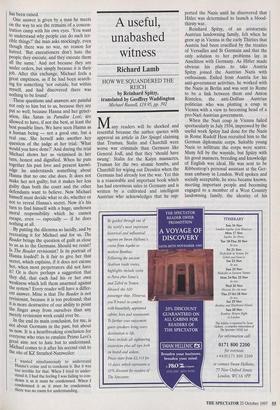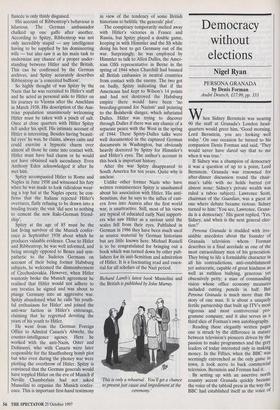A useful, unabashed witness
Richard Lamb
HOW WE SQUANDERED THE REICH by Reinhard Spitzy, translated by Geoffrey Waddington Michael Russell, £19.95, pp. 392 Many readers will be shocked and resentful because the author quotes with approval an article in Der Spiegel claiming that Truman, Stalin and Churchill were worse war criminals than Germans like General Jodi, and that they 'should have swung': Stalin for the Katyn massacres, Truman for the two atomic bombs, and Churchill for wiping out Dresden when the Germans had already lost the war. Yet this is a reasonable and important book which has had enormous sales in Germany and is written by a cultivated and intelligent Austrian who acknowledges that he sup- ported the Nazis until he discovered that Hitler was determined to launch a blood- thirsty war.
Reinhard Spitzy, of an aristocratic Austrian landowning family, felt when he grew up in Vienna in the early Thirties that Austria had been crucified by the treaties of Versailles and St Germain and that the only solution to her problems lay in Anschluss with Germany. As Hitler made obvious his plans to take Austria Spitzy joined the Austrian Nazis with enthusiasm. Exiled from Austria for his anti-government activities, he worked with the Nazis in Berlin and was sent to Rome to be a link between them and Anton Rintelen, the anti-Dolfuss Austrian politician who was plotting a coup in Vienna with a view to becoming head of a pro-Nazi Austrian government.
When the Nazi coup in Vienna failed spectacularly in July 1934, impressed by the useful work Spitzy had done for the Nazis in Rome Rudolf Hess recruited him to the German diplomatic corps. Suitable young Nazis to infiltrate the corps were scarce. Many fell by the wayside, but Spitzy with his good manners, breeding and knowledge of English was ideal. He was sent to be Ribbentrop's personal assistant at the Ger- man embassy in London. Well spoken and socially acceptable, he sow; became known, meeting important people and becoming engaged to a member of a West Country landowning family; the identity of his fiancée is only thinly disguised.
His account of Ribbentrop's behaviour is hilarious. The German ambassador chalked up one gaffe after another. According to Spitzy, Ribbentrop was not only incredibly stupid — any intelligence having to be supplied by his domineering wife — but also saw it as his main task to undermine any chance of a proper under- standing between Hitler and the British. This can be confirmed by the German archives, and Spitzy accurately describes Ribbentrop as 'a conceited buffoon'.
So highly thought of was Spitzy by the Nazis that he was recruited to Hitler's staff and he acted as personal aide to Hitler on his journey to Vienna after the Anschluss in March 1938. His description of the Aus- trian population unanimously welcoming Hitler must be taken with a pinch of salt. Once at close quarters with Hitler Spitzy fell under his spell. His intimate account of Hitler is interesting. Besides having 'beauti- ful eyes' he was, he claims, always calm and could exercise a hypnotic charm over almost all those he came into contact with. Hitler must have had charm or he would not have obtained such ascendancy. Even Anthony Eden acknowledged it after he met him.
Spitzy accompanied Hitler to Rome and Naples in June 1938 and witnessed his fury when he was made to look ridiculous wear- ing a top hat at the Naples opera; he con- firms that the Italians rejected Hitler's overtures, flatly refusing to be drawn into a binding treaty; the visit 'did next to nothing to cement the new Italo-German friend- ship'.
Spitzy at the age of 85 must be the last living survivor of the Munich confer- ence in September 1938 about which he produces valuable evidence. Close to Hitler and Ribbentrop, he was well informed, and being strongly opposed to Benes and sym- pathetic to the Sudeten Germans on account of their being former Habsburg subjects, he welcomed the dismemberment of Czechoslovakia. However, when Hitler wantonly broke the Munich agreement he realised that Hitler would not adhere to any treaties he signed and was about to plunge Germany into an aggressive war. Spitzy abandoned what he calls 'his youth- ful enthusiasm for Hitler' and joined the anti-war faction in Hitler's entourage, claiming that he regretted devoting the years of his youth to Hitler.
He went from the German Foreign Office to Admiral Canaris's Abwehr, the counter-intelligence agency. Here he worked with the anti-Nazis, Oster and Dohnanyi, who with Canaris were later responsible for the Stauffenberg bomb plot but who even during the phoney war were plotting the overthrow of Hitler. Spitzy is convinced that the German generals would have toppled Hitler on the eve of Munich if Neville Chamberlain had not asked Mussolini to organise the Munich confer- ence. This is important first-hand testimony in view of the tendency of some British historians to belittle 'the generals' plot'.
The conspiracy temporarily melted away with Hitler's victories in France and Russia, but Spitzy played a double game, keeping in with Himmler and the SS while doing his best to get Germany out of the war. Surprisingly, he was employed by Himmler to talk to Allen Dulles, the Amer- ican OSS representative in Berne in the spring of 1944 when Churchill had banned all British embassies in neutral countries from contact with the enemy. The two got on badly, Spitzy indicating that if the Americans had kept to Wilson's 14 points and had not destroyed the Habsburg empire there would have been 'no breeding-ground for Nazism' and pointing to the Bolshevik danger, which infuriated Dulles. Hitler was trying to discover through Dulles if there was any chance of a separate peace with the West in the spring of 1944. These Spitzy-Dulles talks were well documented in the captured German documents in Washington, but obviously heavily doctored by Spitzy for Himmler's and Hitler's eyes. The author's account in this book is important history.
After the war Spitzy disappeared to South America for ten years. Quite why is unclear.
Unlike other former Nazis who have written reminiscences Spitzy is unashamed about his association with Hitler. His anti- Semitism, due he says to the influx of east- ern Jews into Austria after the first world war, is unattractive. Still, most of his views are typical of educated early Nazi support- ers who saw Hitler as a saviour until the scales fell from their eyes. Published in German in 1986 they have been much used as source material by German historians but are little known here. Michael Russell is to be congratulated for bringing out a book which was turned down by other pub- lishers for its anti-Semitism and admiration of Hitler. It is a fascinating read and essen- tial for all scholars of the Nazi period.
Richard Lamb's latest book Mussolini and the British is published by John Murray.
`This is only a rehearsal . You'll get a chance to present just cause and impediment at the ceremony.'



















































































 Previous page
Previous page